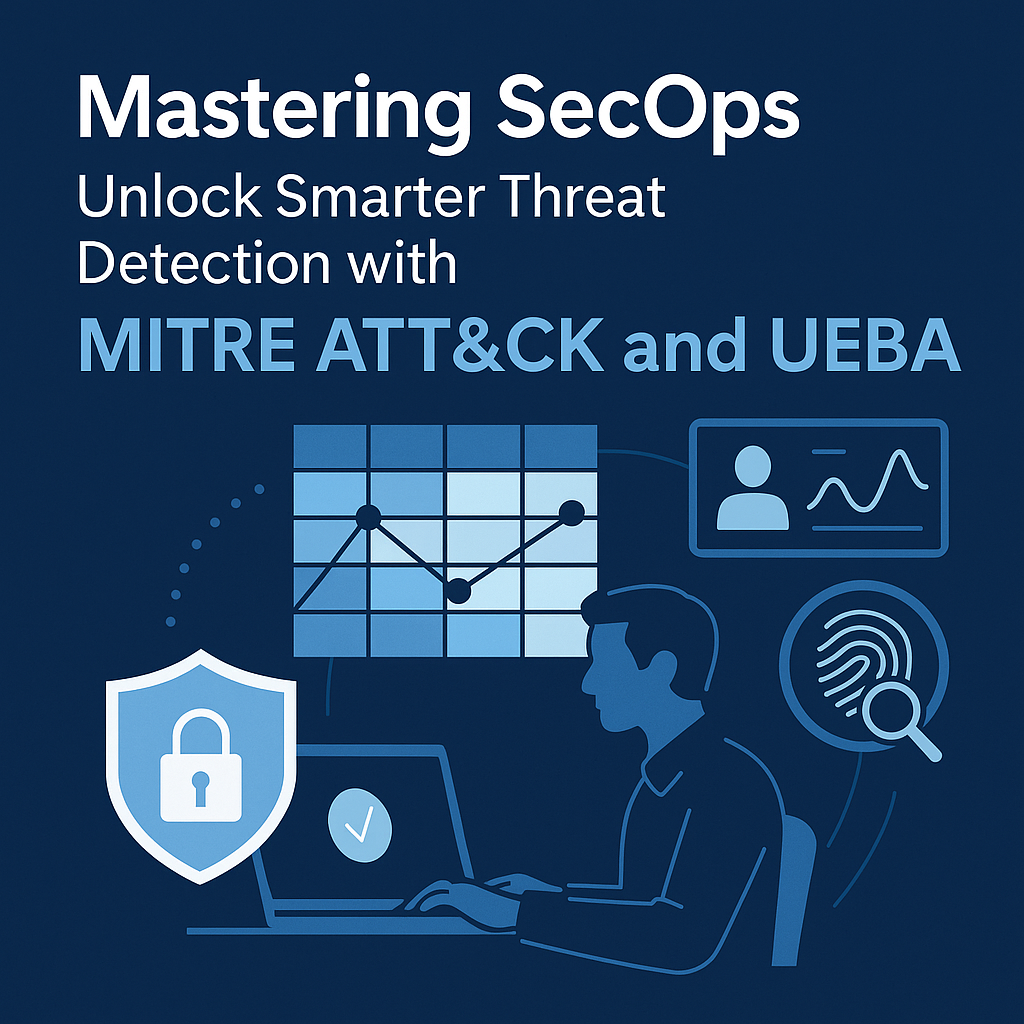Welcome to Enhancing SecOps, a five-part blog series designed to help you improve your Microsoft Sentinel deployment. We’ll guide you from basic log visibility to full security operations maturity. By using frameworks like MITRE ATT&CK and UEBA, this series will walk you through simple strategies for better detection, faster automation, stronger compliance, useful reporting, and smart integrations. Whether you’re running a SOC or just getting started, this series will give you the tools to make Sentinel work better for your team.
🔍 In This Post: Unlock Smarter Detection with MITRE ATT&CK and UEBA
In this first post, we’ll focus on two important tools: MITRE ATT&CK and UEBA. These help you improve how Sentinel finds real threats while reducing noise, but also can show where you could potentially have detection coverage gaps.

Why Use MITRE ATT&CK and UEBA Together?
MITRE ATT&CK is a popular framework that shows how attackers behave. Using it in Sentinel helps you:
- Spot common attack patterns
- Connect alerts to known attack steps
- Focus on the most important detection gaps
UEBA stands for User and Entity Behavior Analytics. It looks at how users and devices normally act and flags strange or risky behavior. This helps you detect:
- Misused accounts
- Suspicious insiders
- Extra permissions being used
- Stolen login details
When you use MITRE ATT&CK and UEBA together, you get both structured detection and behavior insight. This makes your alerts more accurate.
Step 1: Map Sentinel Rules to MITRE ATT&CK
Microsoft Sentinel lets you tag detection rules with MITRE ATT&CK techniques. Here’s how you do it:
- Open or create a rule in Sentinel.
- Go to the “General” or “Rule Logic” tab.
- Find the section called “Tactics and Techniques.”
- Choose the right MITRE IDs (for example, TA0005 – Defense Evasion).
🔗 Guide: Map analytics to MITRE ATT&CK tactics in Microsoft Sentinel

Tip: Use the MITRE Threat Matrix Workbook to see which parts of the attack chain you already cover.
Step 2: Turn On UEBA in Microsoft Sentinel
To use MITRE ATT&CK and UEBA together, you also need to enable UEBA in Sentinel. Follow these steps:
- Go to: Microsoft Sentinel > Configuration > UEBA.
- Choose your workspace and click Enable UEBA.
- Add data sources like:
- Azure AD Sign-ins and Audit Logs
- Office 365 and Exchange logs
- Identity Protection signals
🔗 Guide: Enable and configure UEBA in Microsoft Sentinel

Once it’s on, UEBA will start scoring user and device behavior. You’ll see alerts when something stands out from normal patterns.
Step 3: Create Rules That Combine MITRE ATT&CK and UEBA
The best alerts mix rule-based logic with user behavior context. Here’s an example:
- Look for PowerShell commands (MITRE ID: T1059.001)
- Then check if the user has a high UEBA risk score
This helps you find real threats faster and avoid chasing false alarms.
KQL Example:
SecurityEvent
| where EventID == 4104 and ScriptBlockText contains "Invoke-Expression"
| join kind=inner (
BehaviorAnalytics
| where AnomalySeverity == "High"
) on AccountNameThis rule works because it connects technical activity with behavior risk from MITRE ATT&CK and UEBA.
Final Thoughts
More alerts don’t mean better security. Smarter alerts do. That’s why MITRE ATT&CK and UEBA are so useful. When you use them together in Sentinel, your system becomes much better at finding real threats.
👉 In our next post, we’ll look at how to use Sentinel playbooks to automate responses and add threat intel to your alerts.
If you have seen previous posts from Its Security Day with Mike, I encourage you to check them out here.

Leave a Reply